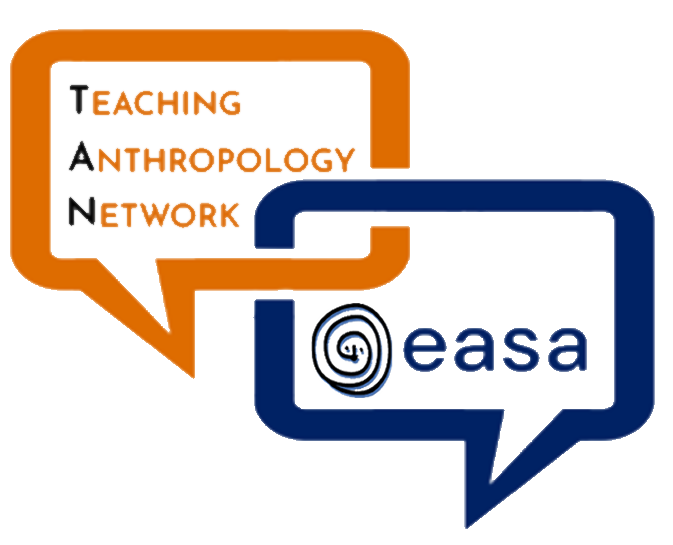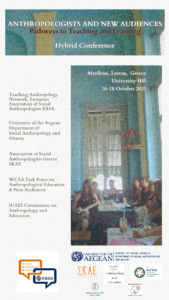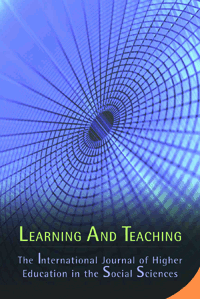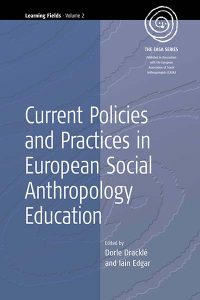The Teaching Anthropology Network was established in 1996 in Barcelona and is one of the oldest EASA networks. The aim of the network is to stimulate discussion and exchange of ideas about teaching anthropology across Europe. We do this through arranging conferences, workshops, publications etc. around teaching and learning anthropology.
The professional lives of European Social Anthropologists cover a wide terrain, but teaching is an important common denominator to which many devote a great deal of time, energy and creativity. It is through teaching and learning that new generations of anthropologists are formed under conditions that are constantly evolving: student enrolment has increased, fieldwork sites and topics are becoming more varied, and university reforms affect the environment of teaching and learning.
The Teaching Anthropology Network (TAN) aims to focus discussion on the problems and potentials of teaching and learning anthropology in the twenty-first century. It organises and publicises events, and provides information about relevant resources and publications. Read more about the network’s background.
A useful way of receiving news is to subscribe to the mailing list – EASA members and others interested in teaching and learning anthropology are invited to subscribe.
Follow and share our postings about teaching Anthropology on our Facebook page
If you have suggestions, ideas or comments about TAN activities, please contact the network Convenors.
Background
Most university anthropologists think of themselves primarily as researchers. Teaching is rarely embraced with the same energy and close identification. Even if we in fact often spend most of our professional lives teaching and supervising, university anthropologists revealingly talk of ‘buying themselves out’ from teaching commitments or of ‘freeing up time for research’. Indeed it is hard to be enthusiastic about teaching when weighed down by administrative loads, ever-increasing numbers of e-mails and when incentive structures point almost unanimously to peer-reviewed publications as the avenue to career advancement. This conspicuous inattention is understandable but unfortunate, because such attitudes can prevent us from seeing teaching as a space for disciplinary development and creativity.
The aim of the EASA Teaching and Learning Anthropology Network (TAN) is to ‘put the issue of diversity in European Anthropology teaching on the table and to start a discussion of what teaching and learning anthropology could be at the start of the twenty first century’ (Dracklé et al. 2004:3). In other words, the vision is to establish a space for anthropologists to exchange ideas and experiences about their practice of teaching. Discussion can range from how to put together a curriculum that is challenging and exciting, to sharing inspiring paedagogies and analyzing how institutional and political reforms are affecting the conditions for learning and teaching anthropology in different European countries.
During the past decades the discipline of anthropology has changed, universities in Europe have been transformed, and the conditions and practices of teaching and learning anthropology have been dramatically altered. Previously anthropology was a small discipline geared to studying remote societies. Now, an increasing number of students are attending anthropology courses, and not all of them are doing fieldwork abroad. In fact – and for many reasons – fieldwork periods are considerably shorter than they used to be, and the majority of our students do fieldwork closer to ‘home’. An increasing university enrolment over the past decades also means that the majority of anthropology students are not going to be academic researchers.
Yet, people construct and conceive their lives partly through their educational experiences (Antikainen et al. 1996). So, even if only a minority of graduates of anthropology will get to work under the designation of anthropologist, the opportunity provided by the discipline to consider their own society and culture in relation to others is likely to broaden outlooks and alter perspectives in significant ways. So, as Ulf Hannerz once wrote in a seminal TAN address, a key question is ‘what we want the students to take from the courses to their working lives, to their imaginative resources?’ (Dracklé et al. 2003: ix).
TAN intends to meet these challenges by taking seriously the experience of teachers and students of anthropology, rather than just following the imperatives of imposed policies and externally defined accreditations and measures of ‘quality’. The network’s primary task is to help anthropologists share ideas of how to face up to these changes at the same time as we retain core ideas of the discipline resting in interconnected notions such as theoretical imaginativeness, serendipity and criticality.




